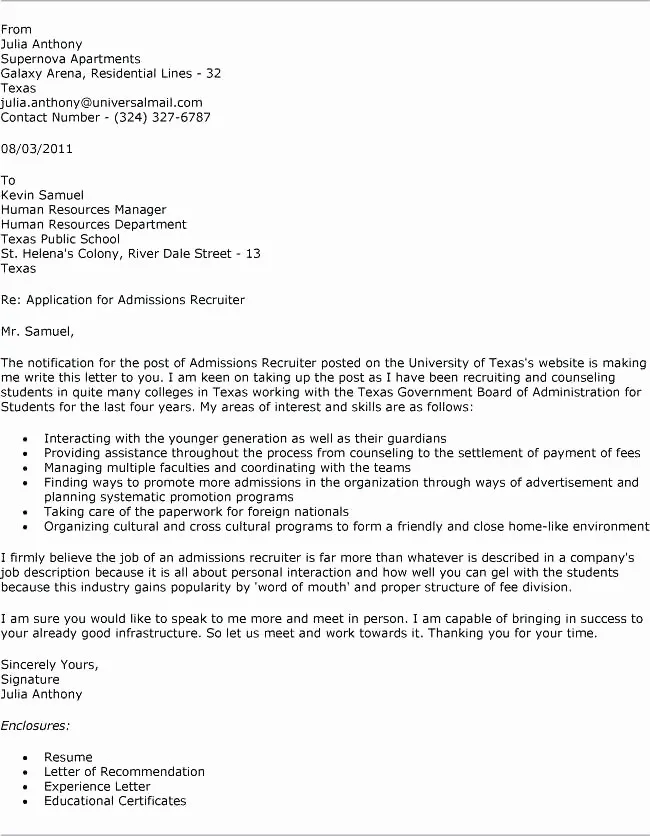5 Steps to a Winning Cover Letter
A cover letter is your first introduction to a recruiting agency, so it’s critical to make a strong impression. It’s your chance to go beyond the resume and showcase your personality, skills, and enthusiasm for the role. A well-crafted cover letter can significantly increase your chances of landing an interview. Following these five steps, you can create a cover letter that captures the attention of recruiters and helps you secure your dream job. Remember that each cover letter should be customized to the specific role and agency you’re applying to. One size fits all approach does not work. To create a winning cover letter it’s essential to understand what recruiters are looking for and to tailor your message accordingly.
Understand the Recruiting Agency’s Needs
Before you start writing, research the recruiting agency to understand its values, mission, and the types of roles it typically fills. This understanding allows you to tailor your cover letter to align with the agency’s needs and demonstrate that you’re a good fit. Examine the agency’s website, social media profiles, and any client testimonials available. This will give you valuable insights into their priorities and the qualities they seek in candidates. Moreover, consider the agency’s specific focus. Some agencies specialize in certain industries or job functions. Understanding their niche can help you target your letter more effectively. For instance, if you’re applying to an agency that specializes in tech roles, emphasize your tech-related experience and skills.
Research the Agency and the Role
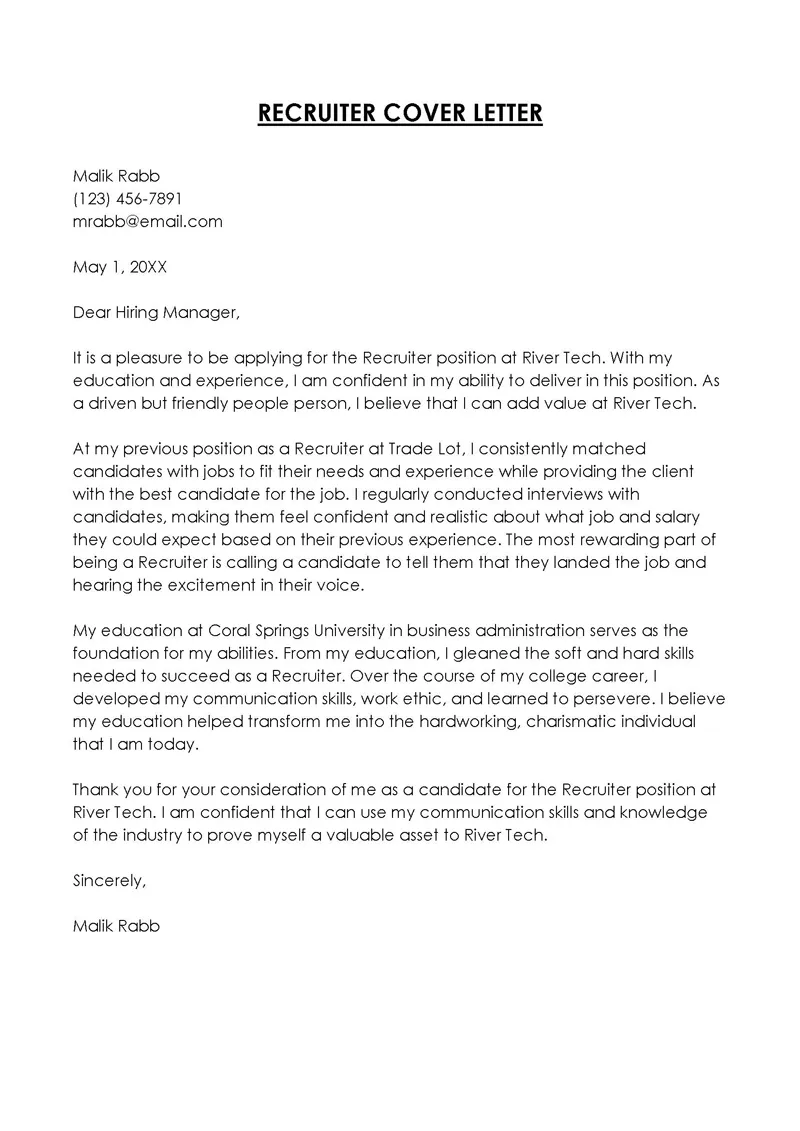
Once you have a basic understanding of the agency, research the specific role you’re applying for. Analyze the job description carefully, paying attention to the required skills, experience, and qualifications. Identify the keywords and phrases used in the description to understand the language the recruiter is using. This research is crucial for tailoring your cover letter effectively. Show that you understand the role’s responsibilities and how your skills align with the agency’s needs. If possible, learn about the hiring manager or the team you would be working with. This information can help you personalize your letter and show genuine interest. Look at similar roles advertised by the agency or its competitors to gain further insights into the industry standards and expectations.
Highlight Relevant Skills and Experience
A cover letter is an excellent opportunity to highlight your skills and experience in a way that goes beyond your resume. It’s where you can tell your story and explain how your background aligns with the job requirements. Focus on the skills and experiences that are most relevant to the role. Use the keywords from the job description to show that you understand what the recruiter is looking for. Provide specific examples of how you’ve used these skills in the past and the results you achieved. Instead of just listing your responsibilities, provide concrete examples of your accomplishments. This demonstrates your value and the impact you can make in the role. Consider using a skills matrix or a similar format to clearly match your skills to the job requirements.
Showcase Achievements
Recruiters want to know what you’ve achieved in your previous roles, not just what you did. Focus on showcasing your accomplishments rather than simply listing your duties. Use the STAR method (Situation, Task, Action, Result) to structure your examples, making them clear and impactful. Describe the situation you faced, the task you were assigned, the actions you took, and the results you achieved. For instance, if you improved customer satisfaction, explain how you did it and the percentage increase in satisfaction. Provide specific examples to demonstrate your ability to deliver results. These examples should be aligned with the requirements of the job. Avoid generic statements and use concrete evidence of your successes to make your cover letter stand out.
Quantify Your Accomplishments
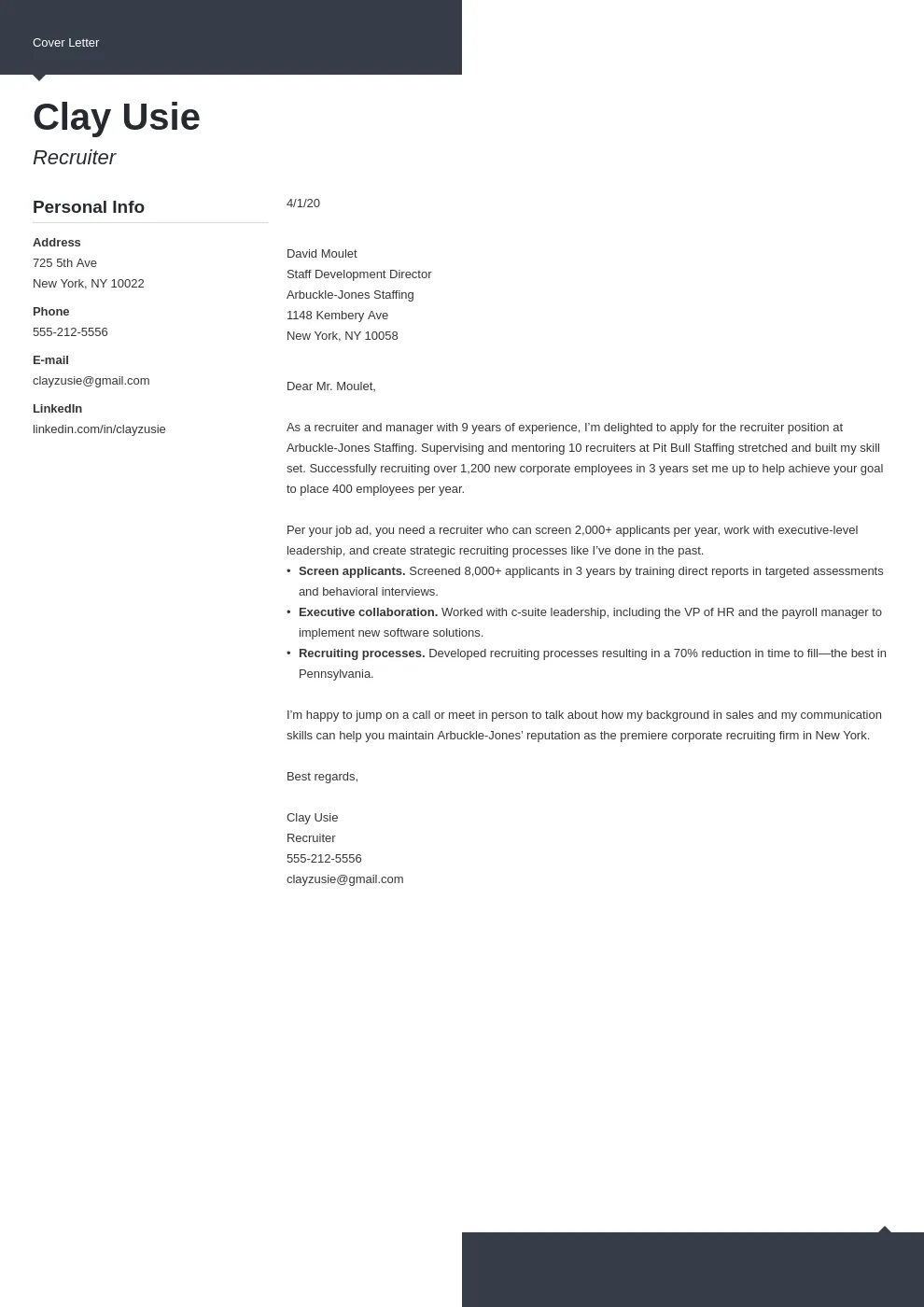
Numbers speak louder than words, especially when it comes to showcasing your achievements. Quantify your accomplishments whenever possible to make a stronger impact. Instead of saying ‘Improved sales,’ say ‘Increased sales by 20% within one quarter.’ This provides concrete evidence of your success. Include metrics like percentages, dollar amounts, and specific numbers to demonstrate the impact of your work. Use data to back up your claims and show the value you brought to previous employers. For example, mention how you reduced costs, increased efficiency, or improved customer retention rates. Quantifying your accomplishments not only makes your cover letter more compelling but also helps recruiters quickly assess your value.
Tailor Your Letter for the Specific Role
Generic cover letters rarely make a strong impression. Tailoring your cover letter to the specific role is one of the most crucial steps in the application process. Each cover letter should be unique, reflecting the requirements of the job and the needs of the recruiting agency. This shows that you have taken the time to understand the role and that you are genuinely interested in the opportunity. When tailoring your letter, use the keywords from the job description and align your skills and experience accordingly. Make sure to address any specific requirements mentioned in the job posting. A personalized cover letter will show the recruiter that you have the right skills and a passion for the work.
Use Keywords From the Job Description
Recruiters often use Applicant Tracking Systems (ATS) to screen applications, and these systems scan for keywords. Including the right keywords from the job description in your cover letter can increase your chances of getting noticed. Carefully review the job description and identify the essential skills, qualifications, and phrases. Incorporate these keywords naturally into your cover letter. Do not stuff keywords, but rather weave them into your sentences to demonstrate that you possess the required skills and experience. Using relevant keywords not only helps your application pass through the ATS but also shows the recruiter that you understand the role and its requirements. This simple step can significantly improve your chances of being noticed.
Address the Recruiter Directly
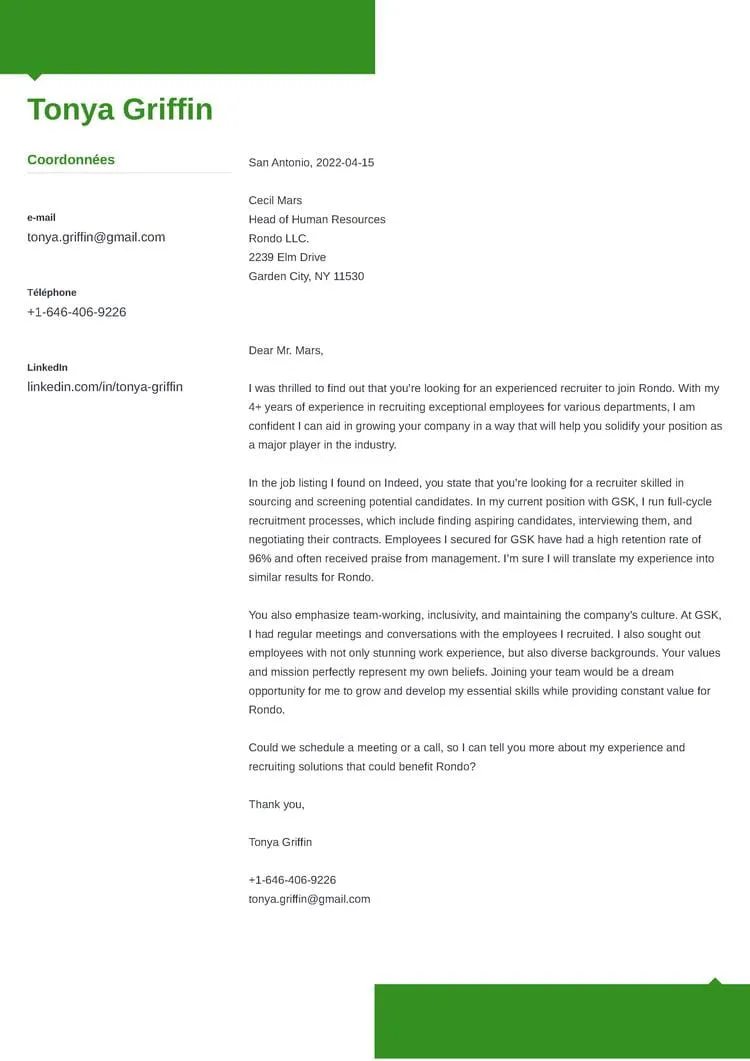
If possible, address your cover letter to a specific person rather than using a generic greeting like ‘To Whom It May Concern.’ Research the recruiter’s name and title, if available. Addressing the letter directly shows that you’ve taken the time to research the agency and demonstrates your attention to detail. If you cannot find a specific contact, you can use a more targeted greeting like ‘Dear Hiring Manager.’ Personalizing your letter will show the recruiter that you have a genuine interest in the position and the agency. Moreover, it makes your application stand out from the many generic applications received.
Craft a Compelling Opening and Closing
The opening and closing paragraphs of your cover letter are crucial. These sections are where you capture the recruiter’s attention and leave a lasting impression. The opening paragraph should immediately grab the recruiter’s attention and state the purpose of your letter. The closing paragraph should summarize your key qualifications and express your interest in the role. The first impression matters, and the opening paragraph sets the tone for your application. A strong opening should make the recruiter want to read further. The closing paragraph should reinforce your value and prompt the recruiter to take action, like scheduling an interview.
The Opening Paragraph
The opening paragraph should be concise and impactful. Start by stating the position you’re applying for and where you saw the job posting. Briefly mention why you’re interested in the role and the agency. Highlight your most relevant skill or achievement to pique the recruiter’s interest. Avoid generic statements and instead, focus on making a strong, immediate impression. For example, you could start with a sentence that highlights your unique skill or a significant accomplishment. Then, briefly explain why you’re a good fit for the agency and the role. Consider starting with a compelling fact or a short statement that showcases your understanding of the agency’s needs. The opening paragraph should be informative and engaging, setting the stage for the rest of your letter.
The Closing Paragraph
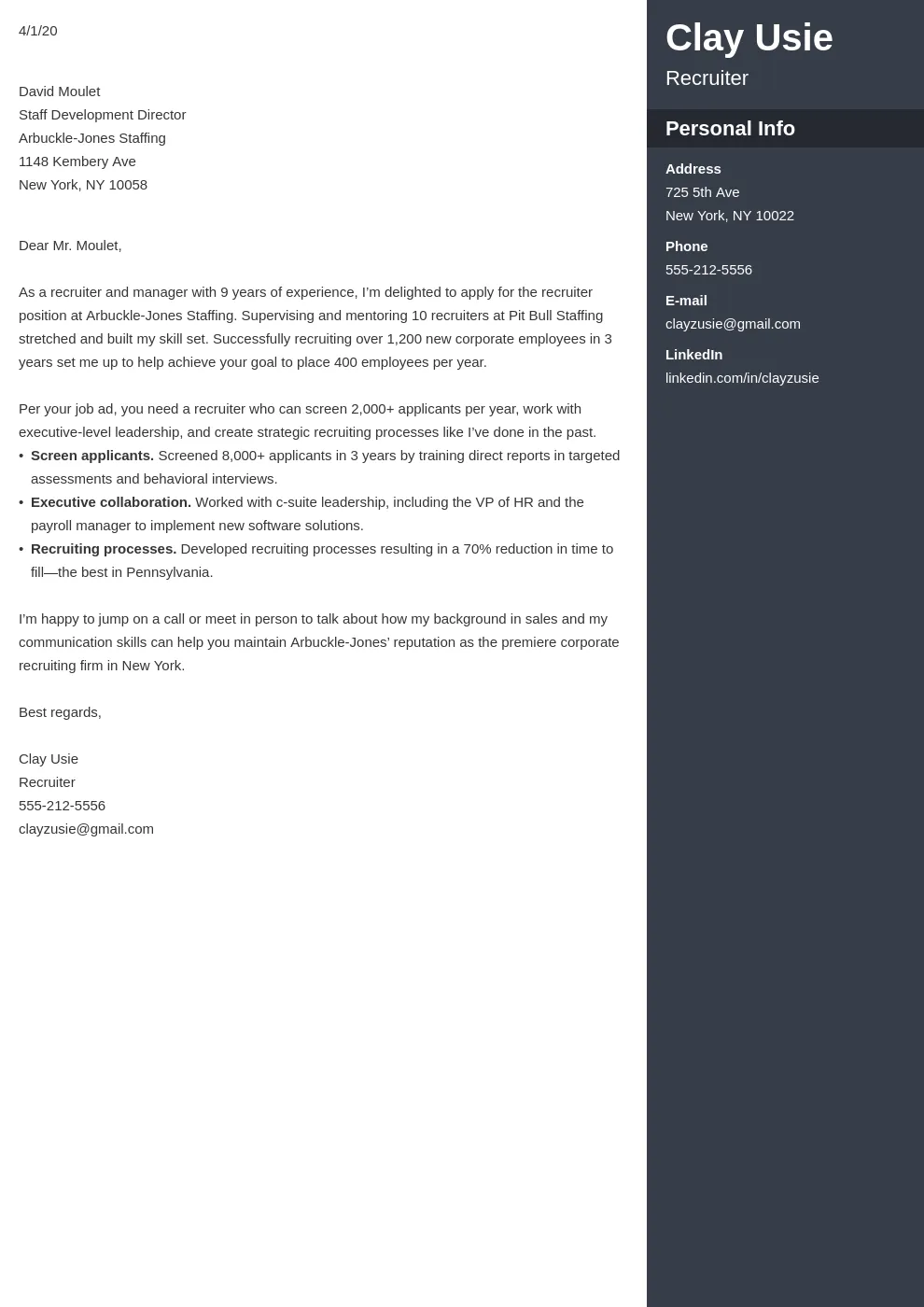
Your closing paragraph should summarize your key qualifications and express your enthusiasm for the opportunity. Reiterate your interest in the role and reiterate why you are a good fit for the company. Thank the recruiter for their time and consideration. Include a clear call to action, such as stating that you’re available for an interview and provide your contact information. Avoid generic phrases, and instead, make it personal and enthusiastic. Show that you are eager to discuss how your skills and experience can contribute to the agency’s success. A strong closing paragraph can leave a positive lasting impression and increase your chances of getting an interview. It is your final chance to demonstrate your interest and make a lasting impact.
Proofread and Edit Your Cover Letter
Before you submit your cover letter, proofread and edit it carefully. Errors can detract from your professionalism and make a negative impression. Check for grammatical errors, spelling mistakes, and typos. Use a grammar checker, but also read the letter aloud to catch any awkward phrasing or inconsistencies. It’s also a good idea to have a friend or colleague review your cover letter for a fresh perspective. They can identify any areas that need improvement and ensure your message is clear and concise. Thorough proofreading demonstrates your attention to detail and your commitment to producing high-quality work. A well-edited cover letter will significantly increase your chances of making a positive impression.
Check for Grammatical Errors
Grammatical errors can undermine your credibility and make it difficult for recruiters to take your application seriously. Proofread your cover letter carefully for any errors in grammar, punctuation, and sentence structure. Use a grammar checker, but don’t rely on it completely. Review the document manually to catch any errors that the software might miss. Pay attention to subject-verb agreement, correct use of pronouns, and the overall flow of your sentences. Incorrect grammar can create a negative impression and make it difficult for recruiters to understand your message. Ensure that your writing is clear, concise, and error-free to showcase your professionalism.
Ensure a Professional Tone
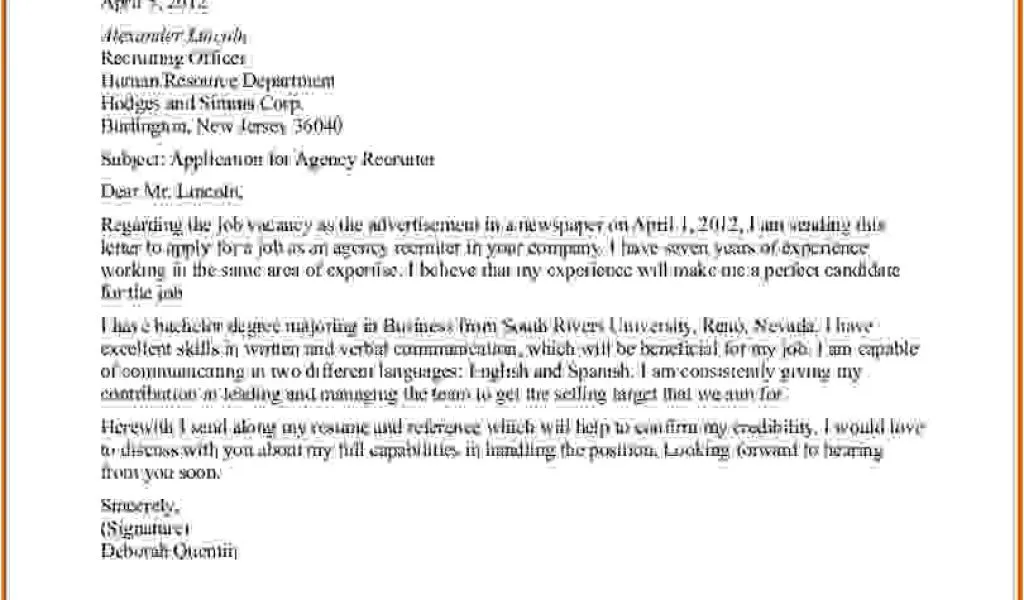
Your cover letter should maintain a professional tone throughout. Avoid slang, jargon, and overly casual language. Use a formal tone that reflects the seriousness of your application. Ensure that your language is respectful and appropriate for a professional setting. Your tone should convey your professionalism and your understanding of business etiquette. Avoid being overly aggressive or overly familiar in your writing. Use positive language and a confident tone to convey your enthusiasm for the role and the agency. Your cover letter should showcase your communication skills and demonstrate your ability to communicate effectively in a professional environment.
